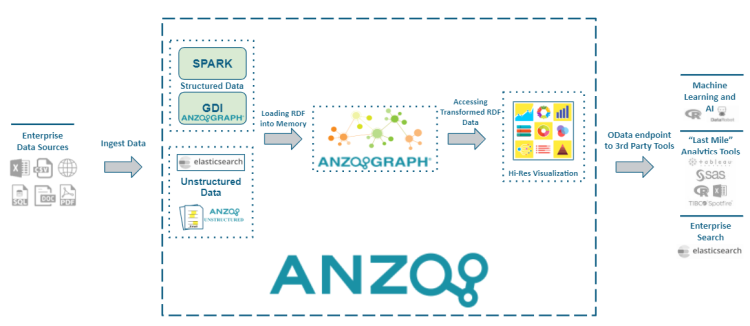Anzo Concepts and Vocabulary
This topic introduces you to key features and concepts to know when working with Anzo. The diagram below shows a high-level overview of Anzo components and concepts. Details about the components in the image are described below.

Enterprise Data Sources
Anzo supports ingesting data from structured, semi-structured, and unstructured data sources. Anzo connects to relational database sources via ODBC and JDBC drivers and supports loading data from CSV, JSON, XML, SAS, and Parquet files. Unstructured data sources such as documents, PDFs, text snippets, web pages, and content from knowledgebases are also supported.
Ingest Data
Structured and semi-structured data sources like relational databases and flat files can be directly loaded using AnzoGraph's Graph Data Interface (GDI) or Anzo’s built-in ETL pipelines.
Unstructured data sources are onboarded using configurable unstructured pipelines. These pipelines onboard unstructured source files, integrate metadata about those files, and make the full text in those files as well as key facts available as part of graph data models.
Loading RDF into Memory
Whether data is ingested with the GDI, ETL pipelines, or unstructured pipelines, it is converted from its original format to a new format that describes the data as a graph model. This format, Resource Description Framework (RDF), simplifies access to complex data and flexibly accommodates new data sources and use cases. The RDF data is added to Graphmarts and loaded to AnzoGraph, Anzo’s in-memory massively parallel processing (MPP) graph OLAP engine, for further transformation and analytics.
Accessing Transformed RDF Data
Users have several options for accessing and analyzing knowledge graphs. Anzo’s Hi-Res Analytics application enables users to create dashboards for exploring and visualizing the data without needing to have specialized query knowledge. And, in line with Anzo's open standard architecture, Graphmarts can be accessed using modern application program interfaces (APIs) as well as SPARQL-compliant query endpoints. Anzo also offers standards-compliant Open Data Protocol (OData)-based REST endpoints as part of its Data on Demand service. The Data on Demand service provides access to data from business intelligence tools.